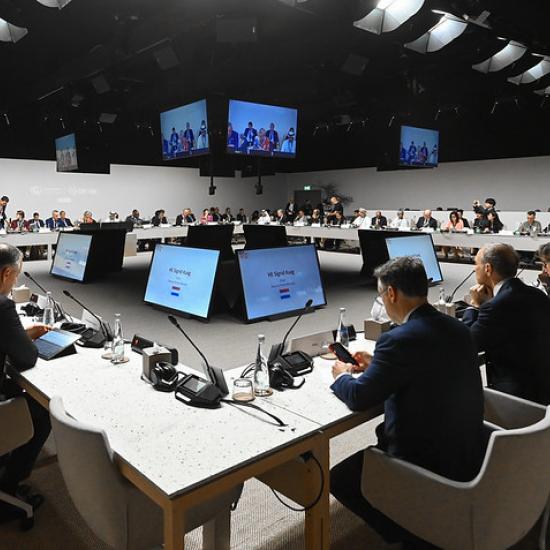By Juliane Reinecke with input from Julia Grimm, co-author of Collaborating on the edge of failure research paper.
Against the backdrop of the hottest year on record, 70,000 delegates from nearly 200 countries are in Dubai to take part in critical international climate negotiations. The 28th UN Framework Convention on Climate Change Conference of the Parties (COP28), the annual gathering of nations to discuss climate action, is a quintessential example of a complex, multi-party negotiation. Governments from the global South and North come together, representing diverse interests and goals. Yet, a fundamental challenge looms: the two-table problem: the disconnect between negotiators representing their countries at the official COP table and the domestic constituents they need to answer to back home.
In our recently published study Collaborating on the Edge of Failure, my co-author, Julia Grimm, and I, offer insights into overcoming this challenge. We argue that successful multi-party negotiation requires fostering not only a shared understanding and committing to a common goal by those who negotiate with one another (ie 'frame alignment'), but also the ability to extend, or even 'stretch' this shared understanding and commitment beyond the negotiating table on which it is discussed. In the context of COP, this translates to bridging the gap between the negotiations in an international arena, and the domestic realities beyond this arena.
Imagine for example a COP delegate in Dubai representing the EU. At the official negotiating table on site the EU delegate engages in complex discussions around emissions targets, carbon markets, and financial aid. They build rapport with colleagues from other nations, forging a sense of shared purpose. Yet, when they return ‘home’, to their EU member states, they face a different audience: their electorate, industries, and civil society groups. These constituents have vastly different priorities, knowledge levels, and even competing interests on what can and should be done about emissions targets, carbon markets, and financial aid.
Discord over the global stocktake – the first assessment of achieved and projected progress on the 2015 Paris Agreement and a key document to emerge from COP28 – reveals such divides: Almost half of the participating countries at COP28 including the EU and 79 Members of the Organisation of African, Caribbean and Pacific States called for the phasing-out of fossil fuels (an end to all new fossil fuel production and end dates for ongoing production) but face stark resistance from many oil producing nations, who prefer the language of phasing-down (reduction of) fossil fuels.


This is where the two-table problem arises. The carefully crafted ‘frame’ of international collaboration established at COP risks fracturing when the delegates, who negotiate on behalf of their constituents, are confronted with domestic pressures back ‘home’. Delegates might face resistance from fossil fuel lobbies, scepticism or immediately financial concerns from citizens, or conflicting political agendas. For instance, we saw that when President Trump announced in June 2017 that the US would withdraw from the historic 2015 Paris climate agreement, which committed signatories to pursue efforts to limit global warming to 1.5C.
Conversely when parties are seen to pursue their own individual country’s interests over joint goals, they risk damaging trust at that international negotiating table. This was demonstrated when leaked documents emerged that suggested the COP28 President Sultan Al Jaber, also the CEO of ADNOC, the UAE’s state oil company, was using climate meetings in the run-up to COP28 to advance his national constituent interests by promoting oil deals, directly undermining the COP process. Without addressing these concerns, the commitments made at COP become mere words on paper, devoid of real-world impact.
Stretching the negotiation frame too far can lead to 'frame break', where the shared understanding collapses. However we argue that these risks are necessary for progress – only by pushing for goals that go beyond the lowest common denominator can joint commitments be made. By iteratively adapting the frame to encompass diverse realities, commitment can be deepened and negotiators can move beyond mere symbolic gestures.
The two-table problem remains a persistent challenge for multi-party negotiations from high-level diplomacy like the COP process to multi-stakeholder initiatives like the German Textiles Partnership we studied. Our research offers four important insights that can be applied to address the two-table problem:
-
Inclusive framing and multi-level engagement:
It is hard enough to get agreement among delegates representing conflicting interests, but the negotiation process does not end with the official delegates: negotiations must engage stakeholders beyond official delegations. This means that involving businesses, civil society, and indigenous groups and other stakeholders “back home” in framing the issues, setting goals, and developing solutions is key to bridge the gap between the official table and the “second table” back home. This fosters understanding, builds trust, and encourages joint ownership of solutions.
-
Transparency and trust-building:
Open communication and information sharing are crucial. Negotiators should regularly inform their constituents about the progress and challenges, addressing concerns and incorporating their feedback. Building trust through transparency fosters a sense of shared responsibility and collective action.
-
Iterative adjustments:
Agreements should be designed to not to be static; they should be “living” documents. As stakeholders raise concerns, negotiators should be willing to revisit and adapt agreements in a flexible manner. This iterative process allows for adjustments that address both internal and external pressures, ensuring continued buy-in from all sides.
-
Embracing failure as a learning opportunity:
Setbacks and breakdowns should be viewed as opportunities to learn and improve. Instead of retreating, negotiators should openly acknowledge failures, analyse their causes (including two-table issues), and use this knowledge to revise processes and communication strategies for future multi-party negotiations. Moreover, negotiation failures also serve as reminders to parties in future negotiations that they must be willing to compromise for the process to succeed.
The two-table problem is a complex challenge, but not an insurmountable one. By fostering multi-level dialogue, stretching the frame of international collaboration to encompass diverse voices, and constantly learning from 'the edge of failure', multi-party collaboration can move from the brink of failure towards a future of shared responsibility and effective climate action.
Background references
Collaborating on the Edge of Failure: Frame Alignment Across Multiple Interaction Arenas in Multi-Stakeholder Partnerships by Julia Grimm, Assistant Professor at Stockholm University and Juliane Reinecke, Professor of Management Studies at Saïd Business School
You can follow Juliane on LinkedIn and Twitter for more reflections from her on COP28 and the role of business schools in tackling the sustainability challenge.
Photos from COP28 in this piece are from the UNFCCC Flickr account courtesy of the UNFCCC.




